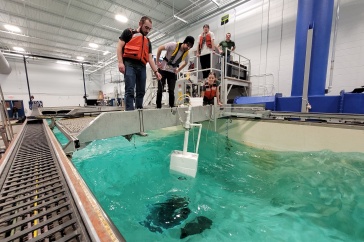
How can we be better prepared for hazardous events? With the help of a prestigious National Science Foundation (NSF) CAREER grant, Weiwei Mo, assistant professor of civil and environmental engineering, hopes to use the knowledge gained in her research of the emergency preparedness of drinking water systems and organizations to answer that question.
“I really want to help bridge this gap between knowledge and action,” Mo says. Her research will help those involved in drinking water hazard response “explore potential outcomes for their decision-making.” In hazardous decision-making situations, actions can sometimes be done without considering all ramifications. This gap between thought process and decision-making is what Mo hopes to avoid, allowing for individuals to be more prepared for hazards as they come, thus allowing them to make informed decisions before dire actions must be taken.
“I really want to help bridge this gap between knowledge and action.”
The $507,000, five-year CAREER grant will enable Mo to develop a framework assessment tool, decision theoretic life cycle assessment, or DT-LCA, to help advance knowledge in emergency management at drinking water system facilities and organizations. Life cycle assessment is an environmental management tool used to evaluate the impact of a product, system or activity on the environment. The decision theoretic life cycle assessment Mo plans to create will take that model, and factor in a person’s or organizations’ choices to determine if the best potential outcomes were made and the reasoning behind those choices.
In order to establish this tool, Mo will use a serious gaming-based approach to engage state, regional and national drinking water system stakeholders in realistic decision-making scenarios, which she hopes will “allow for an understanding of how people will use the resources and time to plan for these emergencies and how people and institutions coordinate with each other to restore the system once an emergency has actually occurred.”
The biggest potential hazard facing drinking water systems today are things like chemical contamination or spills, or algal blooms, according to Mo. In fact, the New Hampshire Department of Environmental Services cautions that algal blooms are a cause for concern in drinking water systems in the state and should be caught early to prevent major issues. The research and knowledge Mo plans to gain from the development of this framework will directly affect decisions and actions related to hazards such as algal blooms, allowing for decision-makers to be prepared and catch these issues early before they become extremely hazardous.
However, the applicability of this decision-making tool and the knowledge gained in this research will go beyond just drinking water systems. According to Mo, drinking water emergency planning and response will be used as an example to illustrate how the DT-LCA can be used as an integrated research, education, and outreach tool to advance both theory and practice in hazard preparation and decision-making.
“We need to have better knowledge, better information, but then we need to use this kind of serious gaming method in order really help stakeholders to understand how they can better coordinate and make better decisions,” in preparation for real life scenarios, says Mo.
This research is not only about producing knowledge related to which policy is better, or which action you need to take under hazardous conditions, but rather Mo says it is a whole approach; it can actually be applied in a variety of different fields.
“Climate change adaptation, COVID-19 and other pandemics, environmental pollution, urban sustainability, and so on. No matter what kinds of problems society faces, they are all complex and we can benefit from this type of system-based approach to thinking, to be able to really solve those problems,” she says.
While Mo has received prior NSF support – for work on the integrated planning of water and energy systems and crowdsourced monitoring for drinking water safety and resiliency, among others – she hopes this CAREER grant will enable her work to combine with the work of others to benefit society. “At the end of the day research is not only about the science, it’s also about team building, community engagement, overall societal benefit, all of those are essential to research.”
-
Written By:
Wesley Hood '20G | UNH Graduate School | wh1047@wildcats.unh.edu



















































